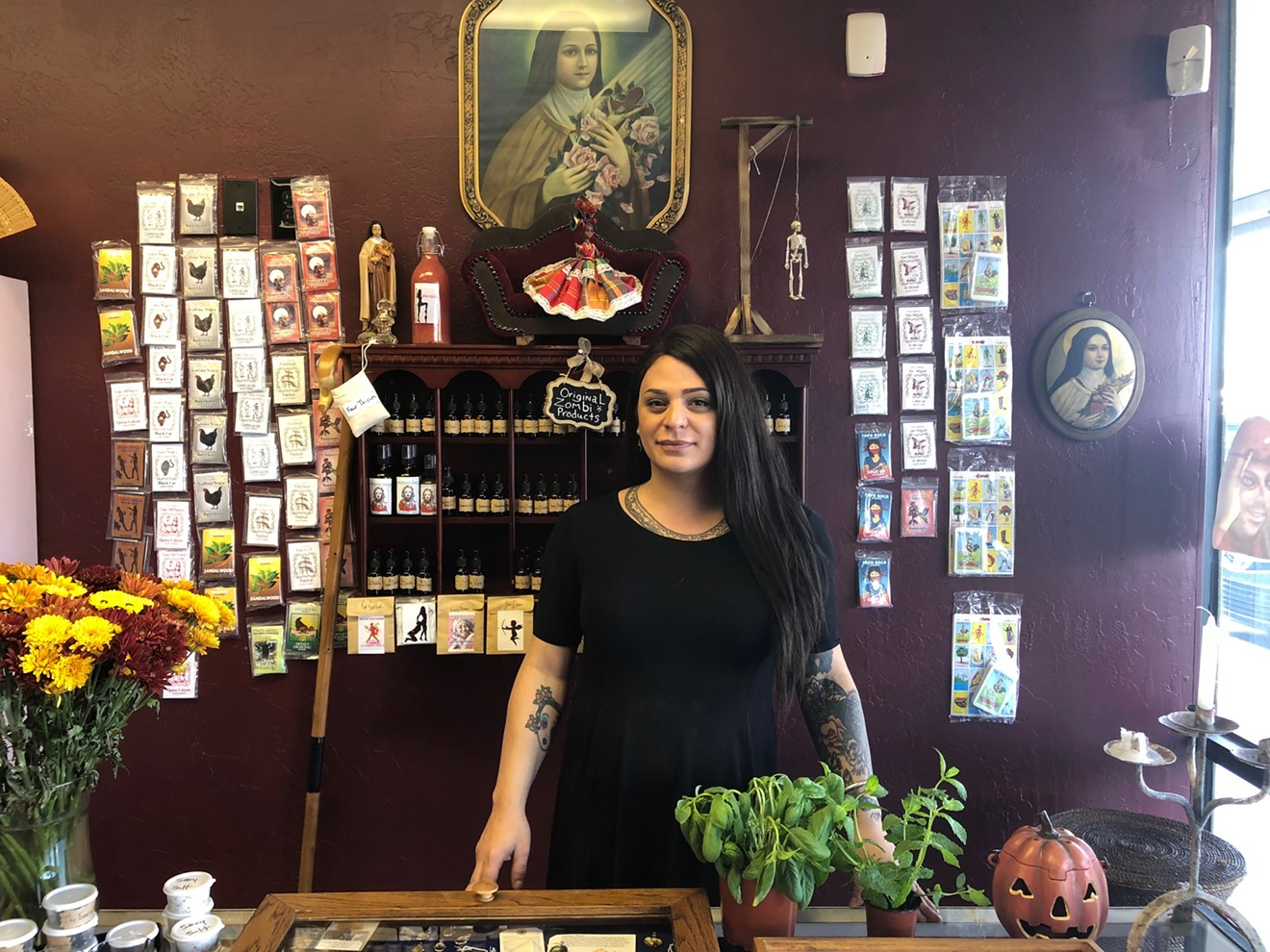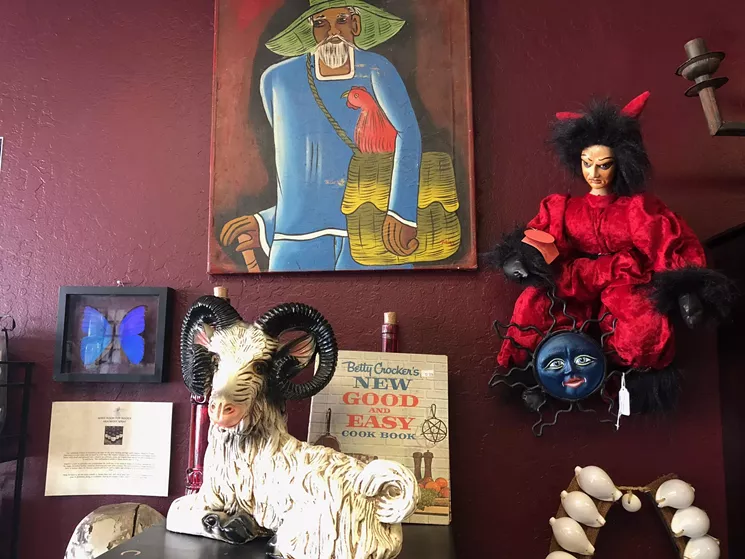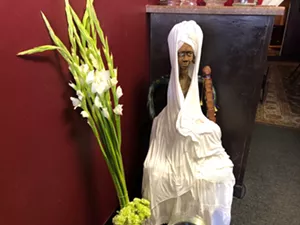If you’ve ever been inside one metaphysical shop, you’ve been inside almost all of them.
No matter what zip code a magick shop is in, odds are good that a familiar assortment of sights will greet you when you walk in: bins full of crystals, bookshelves piled high with shiny new list-price trade paperbacks, incense sticks, Tibetan singing bowls, candles as far as the eye can see, a glass case full of tarot and angel cards, and statues of Ganesh, Buddha, and Baphomet (for stores with a darker side) rubbing elbows. There may even be a few unicorn figurines frolicking on the cash wrap.
That same old, same old “bell, book, and candle” vibe isn’t present at Genevieve El-Masri’s Zombi Apothecary and Conjure Co. While El-Masri’s shop has been open for a spell, it's celebrating its grand opening this Saturday night to support the Arizona Modified Dolls' Zombie Prom charity event happening next door at Irene’s Tap Room. Located at 1245 East Northern Avenue, the small shop looks, feels, and smells like nothing else in town.
Instead of an angelic white paint job, the interiors of Zombi have a rich burgundy hue. Fragrant, label-less candles greet you when you walk in: rows and rows of bright yellow and orange wax. The walls are decorated with a myriad of unusual objects — shell necklaces, old dolls, goat statues, framed butterflies, even a Betty Crocker cookbook with a pentagram on the cover. Offering a tour of her shop, El-Masri points at a handful of crucifixes lining one corner of the shop.
“These were used in exorcisms," she says.
She also points to the most striking image hanging on her walls: a vintage photograph of a slave breastfeeding a white baby. “People ask me all the time if that’s for sale, but it’s not,” she explains.
For El-Masri, the photo is a visual representation of the shop’s dedication to serving a plurality of communities. It also lets you know that you’re in the kind of shop that refuses to ignore injustices or the cruelty of the outside world.
The spirituality on sale inside Zombi isn’t The Secret. As El-Masri says, passing by shrines to the orishas that have been constructed around her shop: “Dancing in the forest is great, but we need to do more work.”
A transwoman of color, El-Masri grew up in Miami. “My parents were immigrants from Cuba — they came here after the revolution,” she says.
El-Masri was initiated into the oft-misunderstood Lucumi tradition at a very young age. Often known as Santeria, it's part of the family of Afro-Caribbean religions that include Vodoun, Palo, and Quimbanda, among others.
“What a lot of people don’t understand about the tradition is that it’s an amalgamation of seven tribes that were enslaved from Africa during the trans-Atlantic slave trade that ended up in Cuba,” El-Masri says.
The name Lucumi, according to El-Masri, comes from a word that means “friendship." “When the slaves were being abused by the Spaniards, they would say ‘O lucumi, o lucumi,’ which meant ‘I am your friend.’... So they shared their traditions and made a religion called friendship,” she says.
One of the things that makes these traditions unique from other Western spiritual traditions (like Wicca or high ceremonial magick) is their emphasis on community. A Lucumi practitioner is part of a grand interrelated web connecting ancestors to fellow community members to nature to the orisha spirits who preside over the world. And it’s that holistic philosophy that has led El-Masri to make some striking, environmentally minded choices for her business.
“I decided I wouldn’t carry any new books — they’ll all be used books,” El-Masri says. This decision is inspired not just by deforestation efforts, but also because the medium is an overrated resource for learning the mysteries.
“For these traditions, it’s about community,” she adds. “You have to track this down and learn from one another. You got to talk. I can show you the plants and the incantations so that you have the power to do it yourself. I give it to you and then you understand it.”
The store doesn't carry crystals or stones either.
“I respect people who choose to use those modalities in their practice, but I also encourage them to think about where we’re getting them from and how it’s a byproduct of industry and of children going into mines and forests being cut down,” El-Masri says. “And they’ll say, ‘Well, don’t have sugar, then. Don’t have coffee.’ I get that. But I feel like whatever little difference that I can make in my industry matters.”
While El-Masri is an active member of the spiritual community in Phoenix (and is planning on being very active at this year’s Pagan Pride Day), she is also an unsparing critic of how other shops can sometimes phone it in.
“We’ve allowed this pseudo-spirituality to take over the narrative of what metaphysics are with absolutely no real understanding of it,” El-Masri says. “Sage, sage, everything is sage — there are so many other fantastic ways to purify something.”
And she doesn’t mince words at how she feels her faith has been co-opted by other occult shops.
“I feel like some of them are inappropriately copying my tradition for the commercial aspect of it," she says. "They’ll have a Vodoun or a Santeria section, but I don’t think they’re quite getting it … They should stop carrying them.”
El-Masri also engages with the community by hosting classes and workshops at her shop. She’s also working with several local businesses (including neighbors 1912 Tattoo Studio and Irene’s Tap Room) in offering an alternative to the drug problems afflicting their community.
“That wasn’t my struggle,” El-Masri says. “I’ve never done heroin — but I didn’t need to in order to care about it.”
The store keeps Narcan kits on-site and hosts a monthly healing event for addicts in recovery. It also takes part in organizing fundraisers and works closely with nonprofit organizations dedicated to addressing AIDS issues, sexual abuse, and survivors of domestic violence.
“I think that these traditions have always been about survival, and about understanding and existing with nature and where we are in society right now,” El-Masri reflects. “The day you die, it’s your eyes that close — it’s nobody else’s. You have to make your life meaningful — you have to go do something that makes things better for the next people.”
The grand opening for Zombi Apothecary and Conjure Co. is scheduled on Saturday, October 12, from 7 to 10 p.m. This is a free event.

Audio By Carbonatix
[
{
"name": "Air - MediumRectangle - Inline Content - Mobile Display Size",
"component": "18478561",
"insertPoint": "2",
"requiredCountToDisplay": "2",
"watchElement": ".fdn-content-body",
"astAdList": [
{
"adType": "rectangle",
"displayTargets": "mobile"
}
]
},{
"name": "Editor Picks",
"component": "16759093",
"insertPoint": "4",
"requiredCountToDisplay": "1",
"watchElement": ".fdn-content-body",
"astAdList": [
{
"adType": "rectangleLeft",
"displayTargets": "desktop|tablet"
},{
"adType": "rectangleRight",
"displayTargets": "desktop|tablet|mobile"
}
]
},{
"name": "Inline Links",
"component": "17980324",
"insertPoint": "8th",
"startingPoint": 8,
"requiredCountToDisplay": "7",
"maxInsertions": 25
},{
"name": "Air - MediumRectangle - Combo - Inline Content",
"component": "16759092",
"insertPoint": "8th",
"startingPoint": 8,
"requiredCountToDisplay": "7",
"maxInsertions": 25,
"watchElement": ".fdn-content-body",
"astAdList": [
{
"adType": "rectangleLeft",
"displayTargets": "desktop|tablet"
},{
"adType": "rectangleRight",
"displayTargets": "desktop|tablet|mobile"
}
]
},{
"name": "Inline Links",
"component": "17980324",
"insertPoint": "8th",
"startingPoint": 12,
"requiredCountToDisplay": "11",
"maxInsertions": 24
},{
"name": "Air - Leaderboard Tower - Combo - Inline Content",
"component": "16759094",
"insertPoint": "8th",
"startingPoint": 12,
"requiredCountToDisplay": "11",
"maxInsertions": 24,
"watchElement": ".fdn-content-body",
"astAdList": [
{
"adType": "leaderboardInlineContent",
"displayTargets": "desktop|tablet"
},{
"adType": "tower",
"displayTargets": "mobile"
}
]
}
]













